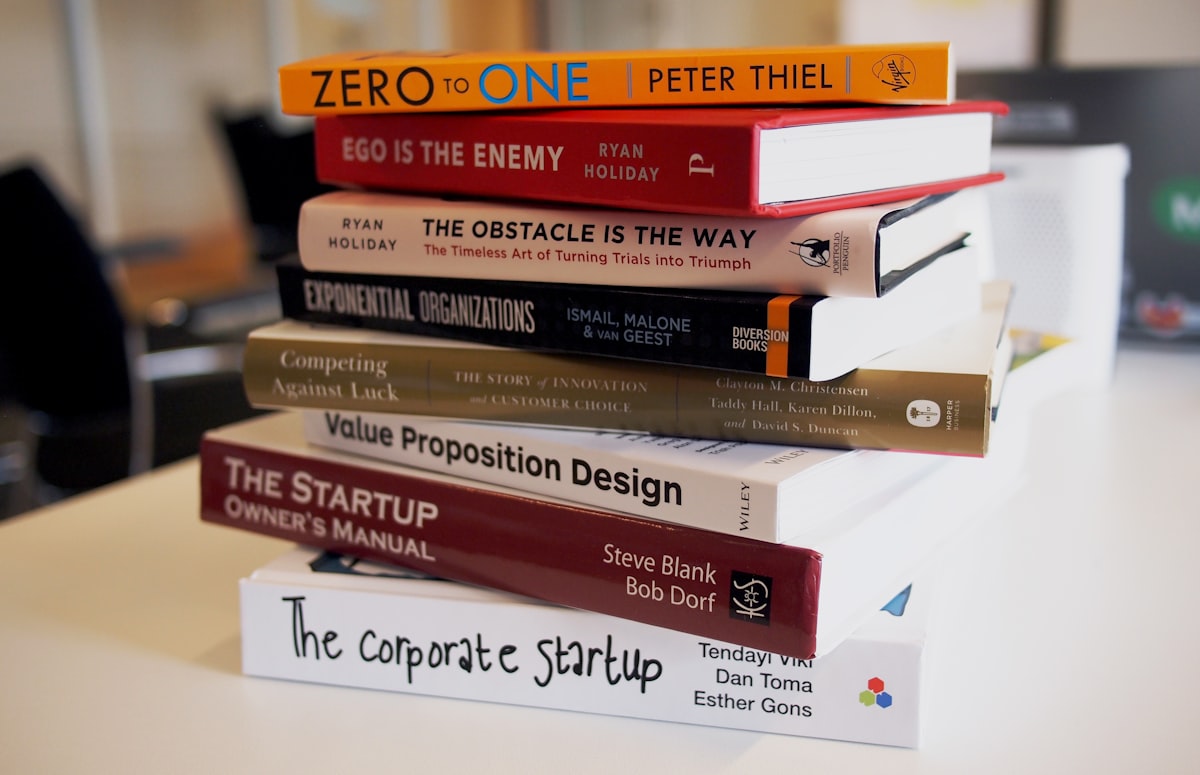The books I recommend the most

Table of content
- Team Management.
- Product Management.
- Agility and delivery.
- Software system design.
- Personal development.
- UI/UX
Team Management
The five dysfunctions of a team by Patrick M. Lencioni
Throughout the story, Lencioni reveals the five dysfunctions that go to the heart of why teams, even the best ones, often struggle. He outlines a powerful model and actionable steps that can be used to overcome these common hurdles and build a cohesive, effective team.
High output management by Andrew S. Grove
Grove covers techniques for creating highly productive teams, demonstrating methods of motivation that lead to peak performance. High Output Management is a practical handbook for navigating real-life business scenarios and a powerful management manifesto that can revolutionize how we work.
Extreme ownership by Jocko Willink
In Extreme Ownership, Jocko Willink and Leif Babin share hard-hitting Navy SEAL combat stories that translate into lessons for business and life. With riveting first-hand accounts of making high-pressure decisions as Navy SEAL battlefield leaders, this book is equally gripping for leaders who seek to dominate other arenas. Jocko and Leif served in SEAL Task Unit Bruiser, the most highly decorated Special Operations unit from the war in Iraq.
97 things every engineering manager should know by Camille Fournier
From mentoring interns to working in senior management, this book will take you through the stages of leadership and provide actionable advice on approaching the obstacles you'll encounter as a technical manager. Here are a few of the 97 things you should know: "Three Ways to Be the Manager Your Report Needs" by Duretti Hirpa, "The First Two Questions to Ask When Your Team Is Struggling" by Cate Huston, "Fire Them!" by Mike Fisher.
Product Management
Inspired: how to create tech products customers love by Marty Cagan
In INSPIRED, technology product management thought leader Marty Cagan provides readers with a master class on how to structure and staff a vibrant and successful product organization and how to discover and deliver technology products that your customers will love and that will work for your business. With sections on assembling the right people and skill sets, finding the right product, embracing an effective yet lightweight process, and creating a strong product culture, readers can take the information they learn and immediately leverage it within their organizations, dramatically improving their product efforts.
The lean startup: How today's entrepreneurs use continuous innovation to create a radically successful business by Eric Ries
The Lean Startup approach fosters companies that are both more capital efficient and that leverage human creativity more effectively. Inspired by lessons from lean manufacturing, it relies on "validated learning," rapid scientific experimentation, and several counter-intuitive practices that shorten product development cycles, measure actual progress without resorting to vanity metrics, and learn what customers want. It enables a company to shift directions with agility, altering plans inch by inch, minute by minute.
Agility & Delivery
Phoenix Project: A novel about DevOps and helping your business win by Gene Kim
Bill, an I.T. manager at Parts Unlimited, has been tasked with taking on a project critical to the future of the business, code named Phoenix Project. But the project is massively over budget and behind schedule. The CEO demands Bill must fix the mess in ninety days, or else Bill's entire department will be outsourced. With the help of a prospective board member and his mysterious philosophy of The Three Ways, Bill starts to see that I.T. work has more familiar with manufacturing plant work than he ever imagined. With the clock ticking, Bill must organize work flow streamline interdepartmental communications, and effectively serve the other business functions at Parts Unlimited.
Clean Agile: Back to Basics by Robert C. Martin
Nearly twenty years after the Agile Manifesto was first presented, the legendary Robert C. Martin ("Uncle Bob") reintroduced Agile values and principles for a new generation–programmers and nonprogrammers alike. Martin, the author of Clean Code and other highly influential software development guides, was there at Agile's founding. Now, in Clean Agile: Back to Basics, he strips away misunderstandings and distractions that, over the years, have made it harder to use Agile than initially intended. Martin describes what Agile is in no uncertain terms: a small discipline that helps small teams manage small projects . . . with huge implications because every big project is comprised of many small projects. Drawing on his fifty years of experience with projects of every conceivable type, he shows how Agile can help you bring true professionalism to software development.
Theory of Constraints by Eliyahu M. Goldratt
The theory of Constraints walks you through the crucial stages of a continuous program: the five steps of focusing; the process of change; how to prove effect-cause-effect; and how to invent simple solutions to complex problems. Equally important, the author reveals the devastating impact an organization's psychology can have on the improvement process. The theory of Constraints is a crucial document for understanding what it takes to achieve manufacturing breakthroughs.
Programming Explained (2nd Edition) by Kent Beck and Cynthia Andres
"Extreme Programming Explained is the work of a talented and passionate craftsman. Kent Beck has brought together a compelling collection of ideas about programming and management that deserves your full attention. My only beef is that our profession has gotten to a point where such common-sense ideas are labeled 'extreme.'..." ― Lou Mazzucchelli,
Accelerate: The Science of Lean Software anDevOpsps: Building and Scaling High Performing Technology Organizations by Nicole Forsgren, Jez Humble, and Gene Kim
This book presents the findings and the science behind that research, making the information accessible for readers to apply in their organizations. Readers will discover how to measure the performance of their teams and what capabilities they should invest in to drive higher performance. This book is ideal for management at every level.
System Design
Designing Data-Intensive Applications: The Big Ideas Behind Reliable, Scalable, and Maintainable Systems by Martin Kleppmann
In this practical and comprehensive guide, author Martin Kleppmann helps you navigate this diverse landscape by examining the pros and cons of various technologies for processing and storing data. The software keeps changing, but the fundamental principles remain the same. With this book, software engineers and architects will learn how to apply those ideas in practice and fully use data in modern applications. Peer under the hood of the systems you already use and learn how to use and operate them more effectively. Make informed decisions by identifying the strengths and weaknesses of different tools. Navigate the trade-offs around consistency, scalability, fault tolerance, and complexity. Understand the distributed systems research upon which modern databases are built, Peek behind the scenes of primary online services, and learn from their architecture.
Building Microservices by Sam Newman
With many examples and practical advice, this book takes a holistic view of the topics system architects, and administrators must consider when building, managing, and evolving microservice architectures. Microservice technologies are moving quickly. Author Sam Newman provides a firm grounding in the concepts while diving into current solutions for modeling, integrating, testing, deploying, and monitoring your autonomous services. You'll follow a fictional company throughout the book to learn how building a microservice architecture affects a single domain.
Personal development
12 Rules for Life: an Antidote to Chaos Jordan Peterson
Jordan Peterson has helped millions of people, young and old, men, and women, aim at a life of responsibility and meaning. Now he can help you.
Drawing on his work as a clinical psychologist and lessons from humanity's oldest myths and stories, Peterson offers twelve profound and realistic principles to live by. After all, as he reminds us, we each have a vital role to play in the unfolding destiny of the world.
Profound, rewarding, and enlightening, 12 Rules for Life is a lifeboat built solidly for stormy seas: ancient wisdom applied to our contemporary problems.
UI/UX
Principles of Mobile App Design from Think with Google (free ebook)
P.S.: I recommend these books because I know they will help you grow, but I need to be precise that the links here are affiliate links, so I will make a small percentage of the price it costs to buy the book.




Comments ()